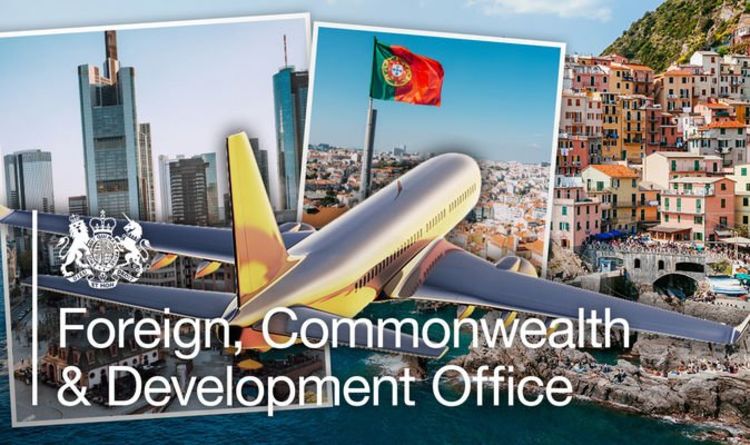Holidays: France, Italy, Spain, Greece & Portugal latest FCDO advice for essential travel
Priti Patel calls out influencers for travelling during pandemic
Countries across Europe have clamped down on international arrivals, with new rules and restrictions in place. Furthermore, for Britons leisure travel remains off the card as the third national lockdown continues.
However, travel for “essential” reasons is permitted, though UK travellers must make sure they follow the specific rules set out by their chosen destination.
The Foreign, Commonwealth and Development Office (FCDO) provides the latest travel advice for countries around the world.
Here are the latest updates for France, Italy, Spain, Greece and Portugal.
France
The FCDO is currently advising against “all but essential travel” to France “based on the current assessment of COVID-19 risks.”
On January 31, 2021, France announced they would be restrictions all travel to and from non-EU countries. Furthermore, restrictions for travel between the UK and France have been in place since December 20, 2020.
Travel restrictions apply to all air, car, ferry, and train passengers.
Only specific travellers will be allowed to enter France under current guidance.
This includes French nationals and nationals of the European Area, along with their spouses and children.
British and third-country nationals who are residents in France, the EU or the European Area are also permitted to travel for “certain essential reasons”.
All travellers from the UK, including children aged 11 and above, willed to present a negative PCR test result carried out less than 72 hours prior to departure.
Arrivals from the UK will also need to undertake a period of seven days self-isolation before taking a second PCR test which can free them.
A “sworn statement” self-certifying travellers do not have any Covid symptoms must also be given, as well as a signed “travel certificate” confirming the essential reason for travel.
There are also a number of coronavirus restrictions in place in France due to the “severe” health situation.
This includes a national curfew which is in place from 6pm to 6am.
Travellers from France returning to the UK must self-isolate on arrival.
We will use your email address only for sending you newsletters. Please see our Privacy Notice for details of your data protection rights.
Italy
The FCDO is currently advising against “all but essential travel” to the whole of Italy “based on the current assessment of COVID-19 risks.”
Until March 5, Italy is only permitting entry for those with official residency or those with absolute necessity, which must be declared in writing.
Passengers wishing to fly must present their chosen airline with a negative COVID-19 rapid antigenic or molecular swab test taken no more the 72 hours prior to arrival in Italy.
“You must also take a COVID-19 rapid antigenic or molecular swab test within 48 hours of entering Italy – arrivals by air from the UK will take this test at the airport,” states the FCDO.
“Whatever the result of the two swab tests, those arriving in Italy from the UK must also report to their local health authorities on arrival and self-isolate for 14 days.”
Travellers will also need to complete a self-declaration form and an online questionnaire.
Furthermore, everyone arriving in Italy must call the COVID-19 helpline for the region they are visiting within 48 hours to inform them of their visit.
Coronavirus restrictions remain in place across Italy, including a nighttime curfew between 10pm and 5am, reduced public transport, and the mandatory use of face masks in all public spaces.
Travellers returning to the UK from Italy must self-isolate.
DON’T MISS
Camping and caravan holidays: Expert warns against booking last minute [INTERVIEW]
Spain holidays: UK to be ‘one of first to return’ to Majorca [COMMENT]
Prince William and Kate broke travel rule for Prince George [INSIDER]
Spain
The FCDO is currently advising against “all but essential travel” to Spain, including the Balearic Islands but excluding the Canary Islands, “based on the current assessment of COVID-19 risks.”
Spain put in place travel restrictions on passenger travel from the UK from December 22, 2020.
These measures have since been extended until February 16, 2021.
However, Spanish nationals and legal residents of Spain are still permitted to travel.
Passengers on flights from the UK must present a negative PCR, TNA or LAMP test taken within no more than 72 hours prior to arrival in Spain.
Residents of the country are advised to their residence document and valid passport when travelling.
According to the FCDO, accepted residence documents include “the green paper EU resident certificate or the new TIE.”
It adds: “The Spanish authorities have not confirmed whether other documents are being accepted as sufficient proof of residence to enable entry to Spain.
“We strongly advise that you contact your airline before travelling to confirm your proof of residency meets the requirements of your airline.”
Arrivals into Spain will also need to fill out an online health control form 48 hours prior to travel. This can be downloaded on the Spain Travel Health Website.
Overland passengers are currently exempt from testing rules.
Within Spain, a number of coronavirus restrictions remain in place, including a national curfew and specific localised measures.
Travellers are advised to check with their region of travel for restrictions currently in place.
“If you are returning to the UK from the Canary Islands on or after 4am on 12 December 2020, you will need to self-isolate on your return,” states the FCDO.
“You must still self-isolate if returning to the UK from any other part of Spain.”
Greece
The FCDO is currently advising against all but “essential” travel to Greece based on “the current assessment of COVID-19 risks”. The FCDO is not advising against travel to the islands of Rhodes, Kos, Zakynthos, Corfu and Crete.
Greece is allowing UK nationals to enter the country if they are permanent residents in the UK, Greece, another European Union state or in Australia, Japan, New Zealand, Rwanda, Singapore, South Korea, Thailand or UAE.
Passengers travelling into Greece will need to complete a Passenger Locator Form at least 24 hours prior to departure.
Failure to do so many result in being denied travel, a €500 fine or denied entry at the border.
All arrivals must also provide a negative COVID-19 test undertaken within the 72 hours prior to arrival.
“Anyone entering Greece from the UK will also be asked to undergo a rapid test for COVID-19 on arrival,” explains the FCDO.
“Arrivals from the UK are currently required to self-isolate for seven days in the event of a negative test result.
“In the event of a positive test result, travellers will have to isolate for at least 14 days. In either case, travellers will need to undertake a further PCR test at the end of their period of self-isolation.”
A number of restrictions are in place in Greece which visitors must adhere to.
There are national lockdown measures which apply to the entire country, as well as a traffic light system in place for certain regions where further rules may apply.
Measures include the mandatory use of facemarks in all public spaces, a ban on non-essential movements outside of the home, and a ban on travel.
UK travellers returning from Greece will need to self-isolate upon arrival.
Portugal
The FCDO is currently advising against travel to “mainland Portugal, including the autonomous regions of Madeira and Azores, based on the current assessment of COVID-19 risks.”
Furthermore, the country is currently on the UK’s “high risk” list.
“Flights between the UK and Portugal (including the autonomous regions of Madeira and Azores) are currently suspended,” states the FCDO.
“Visitors who have been in or transited through Portugal (including the autonomous regions of Madeira and Azores) in the previous 10 days cannot enter the UK.”
UK nationals in Portugal who wish to return to the UK will have to travel via other airports.
British and Irish nationals, and third-country nationals with residence rights in the UK, arriving in the UK from Portugal will need to self-isolate along with their households on their return. From February 15, this must be undertaken in a Government designated quarantine hotel.
Travel to Portugal is limited to EU and European Area nationals and their family members, UK citizens with residency rights in Portugal, and people travelling for “essential purposes”.
Arrivals must show a negative RT-PCR test result taken within 72 hours of departure.
Passengers who can not show this evidence are “likely” to be denied boarding.
Travellers arriving in Madeira will need to take a second RT-PCY test five to seven days after their initial test.
Until the results of this second test have been received, travellers must stay in self-isolation.
Mainland Portugal remains in a “state of emergency” meaning people must “stay at home” with the exception of very specific circumstances including to receive medical care, collect essential items or take short periods of outdoor exercise.
Source: Read Full Article





